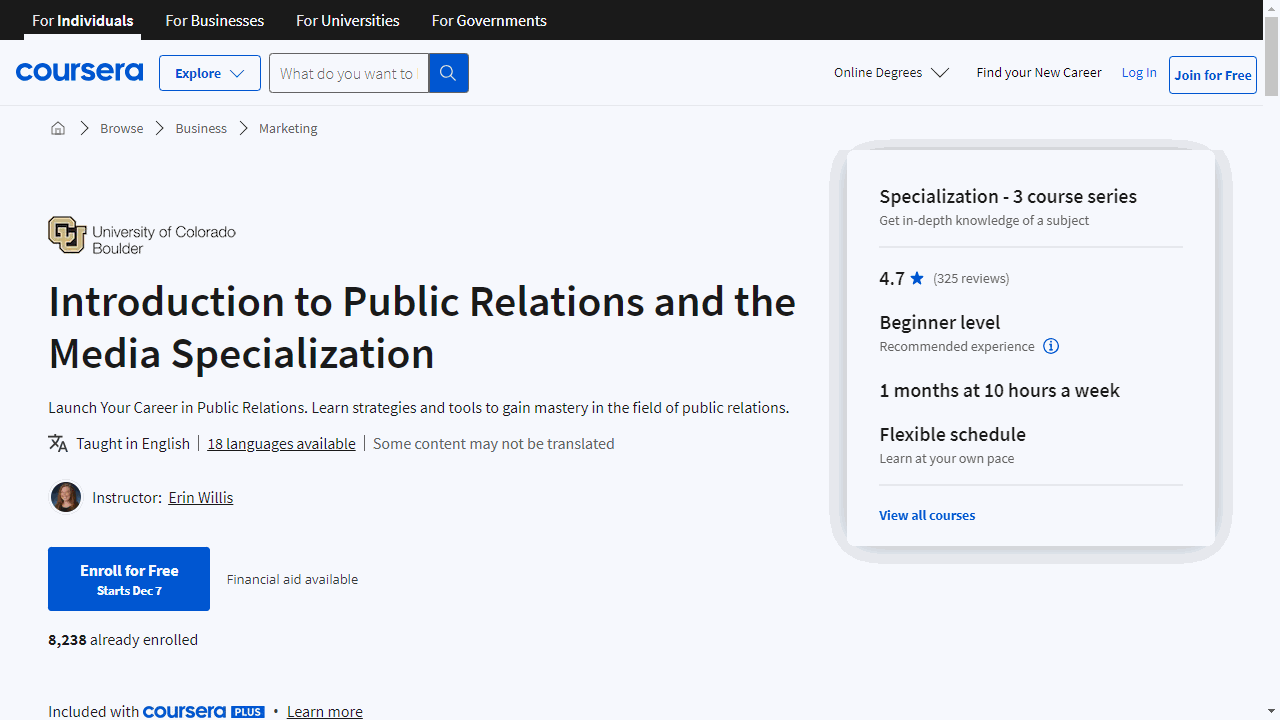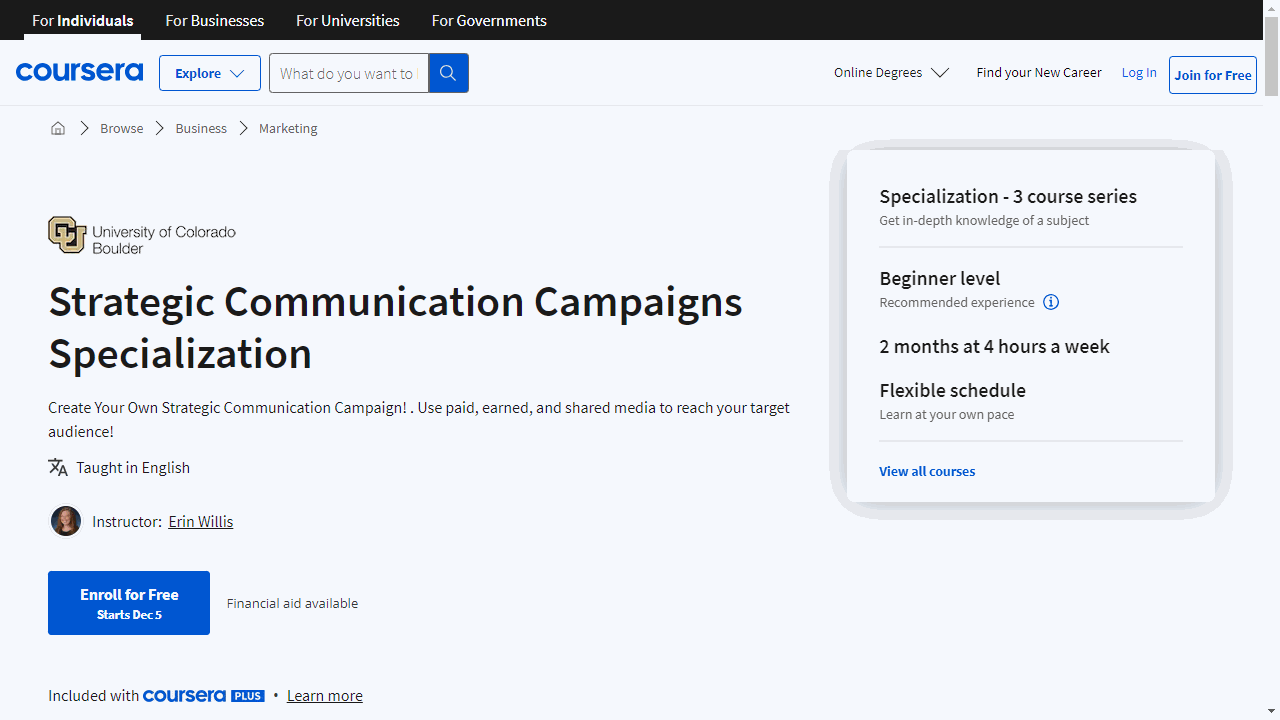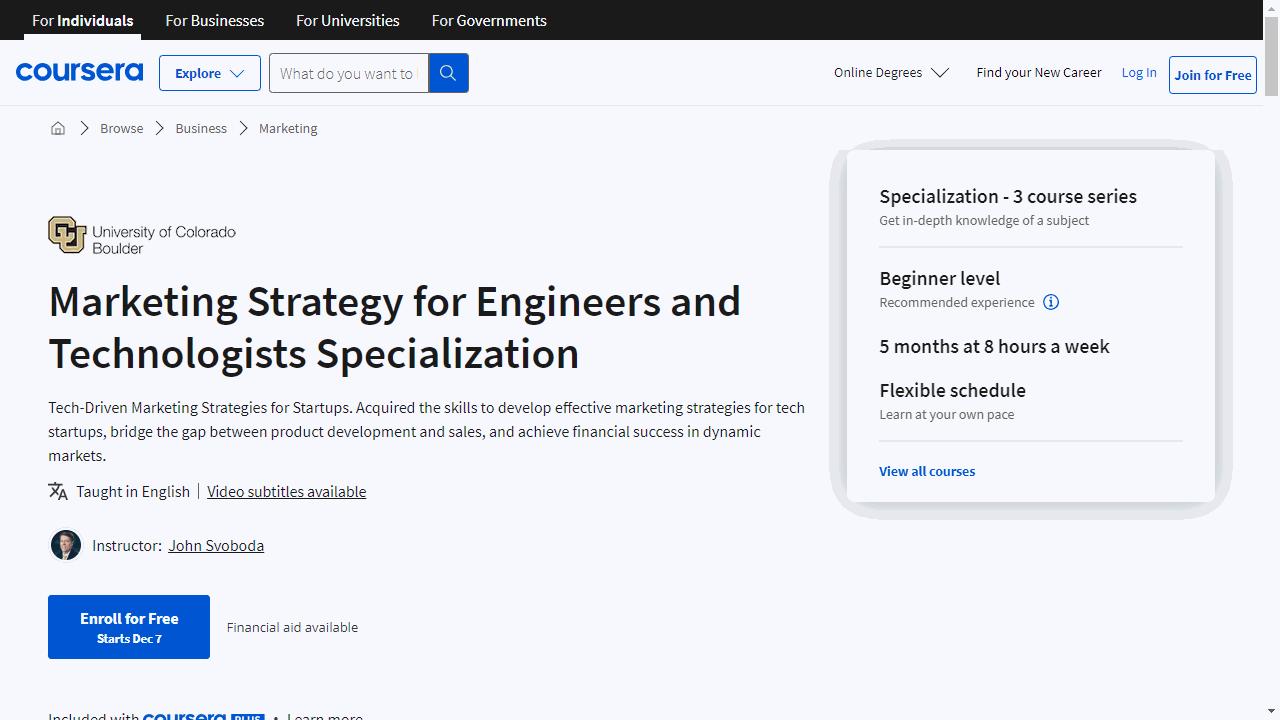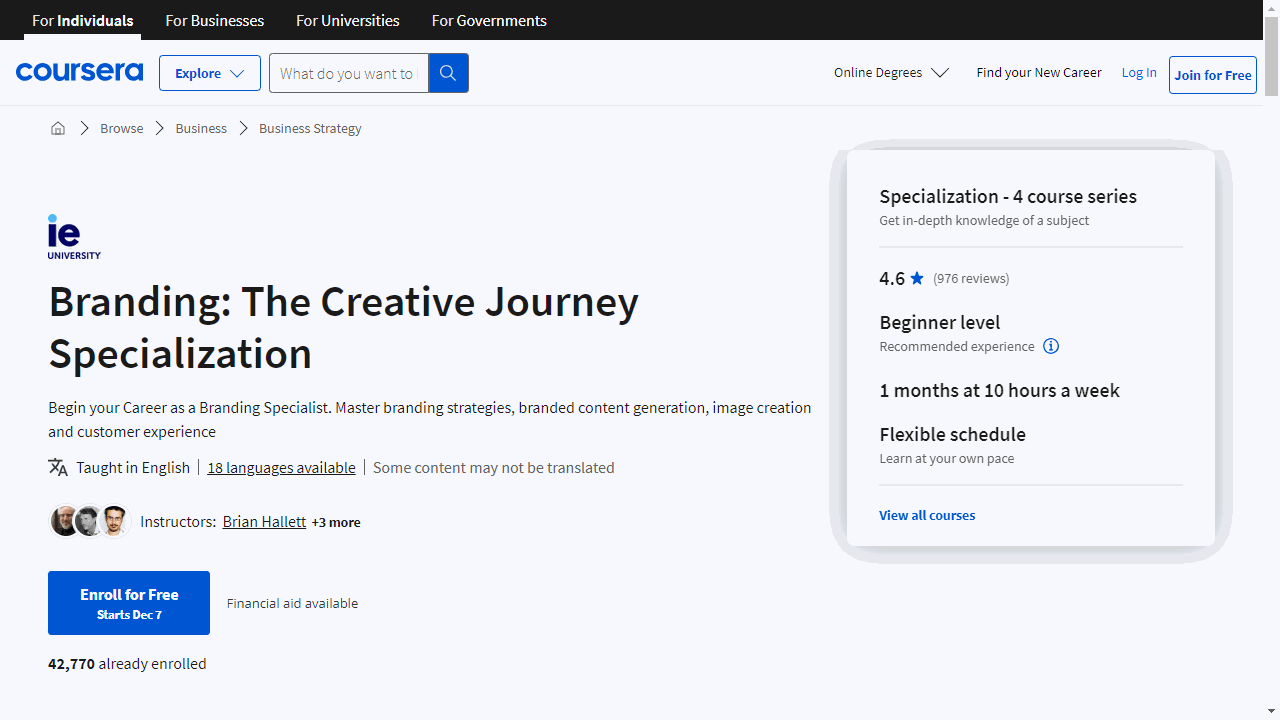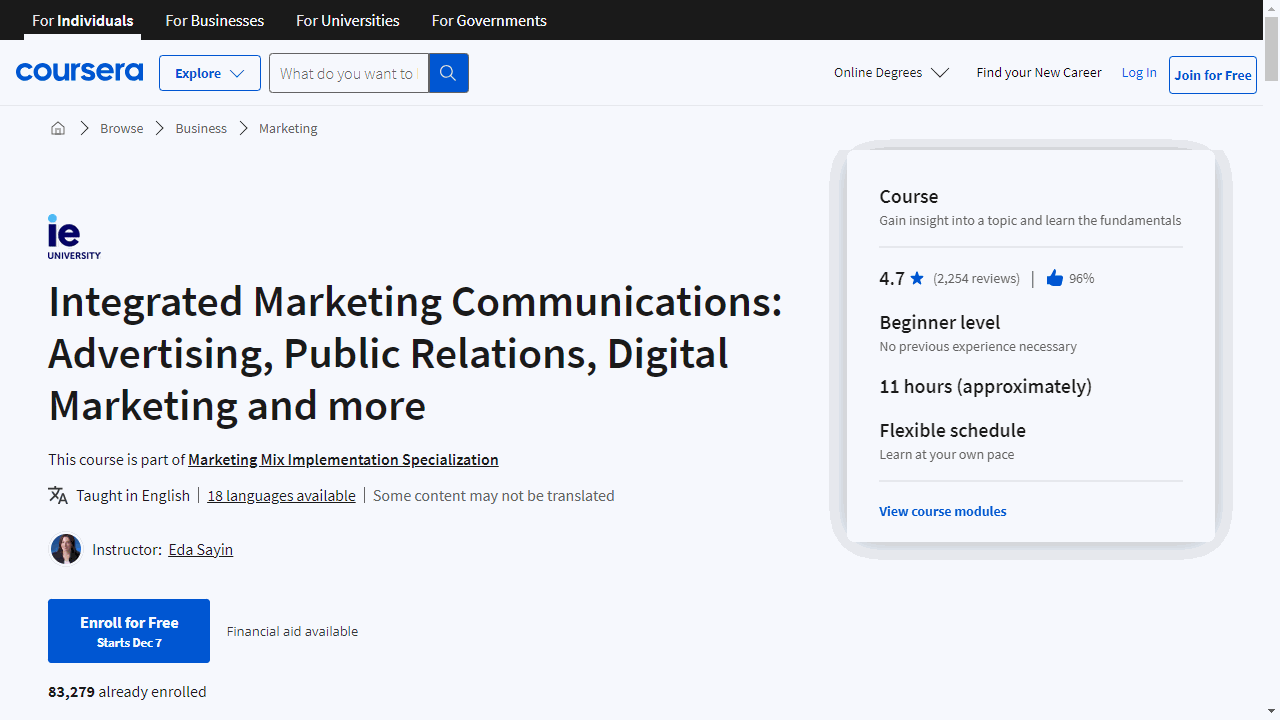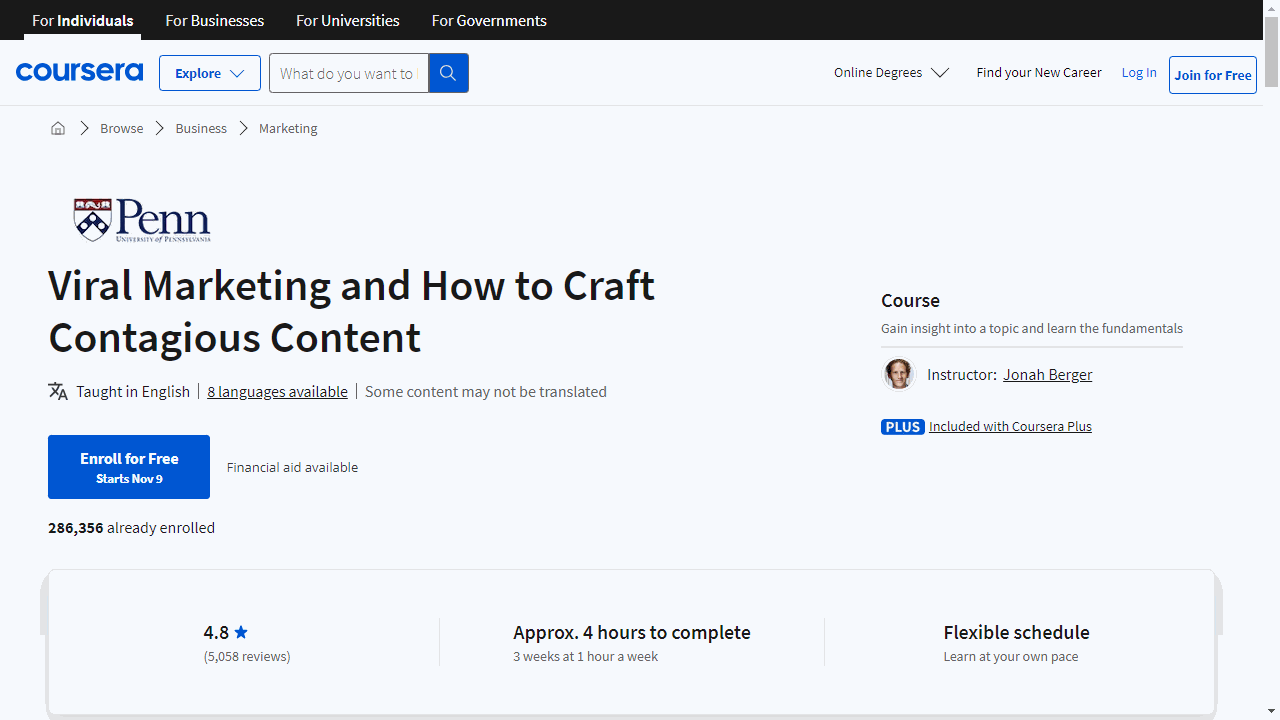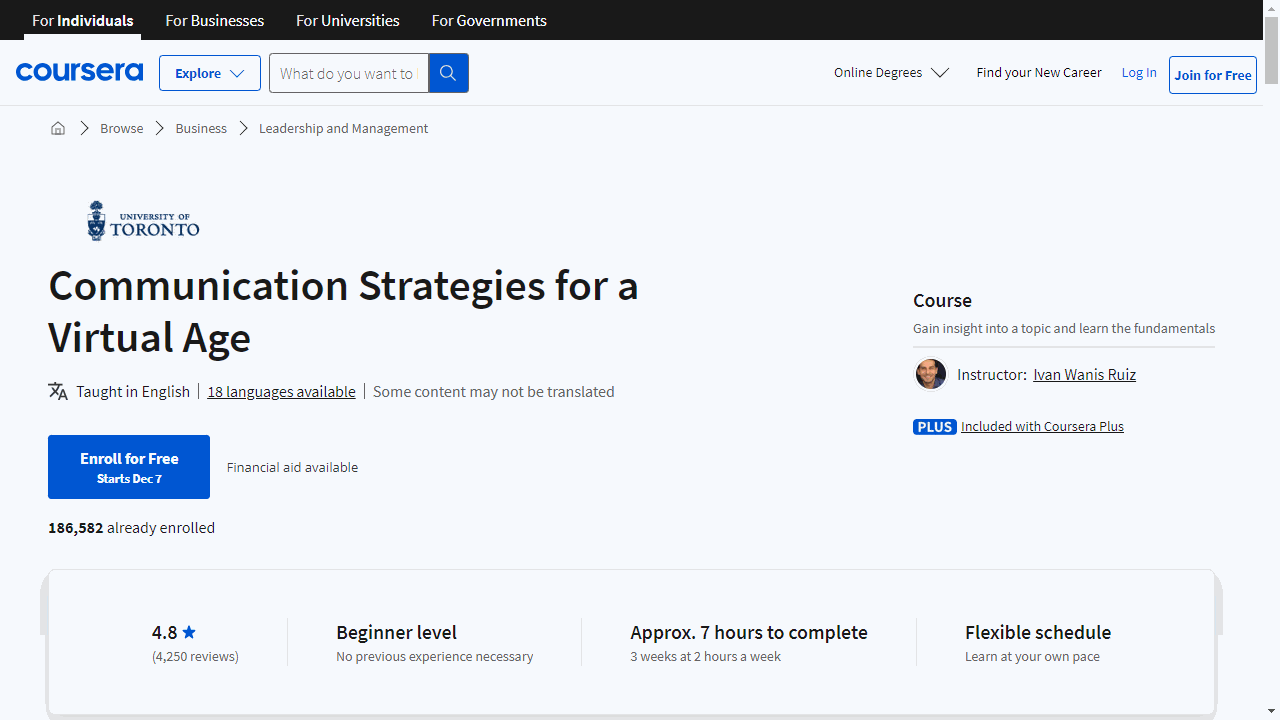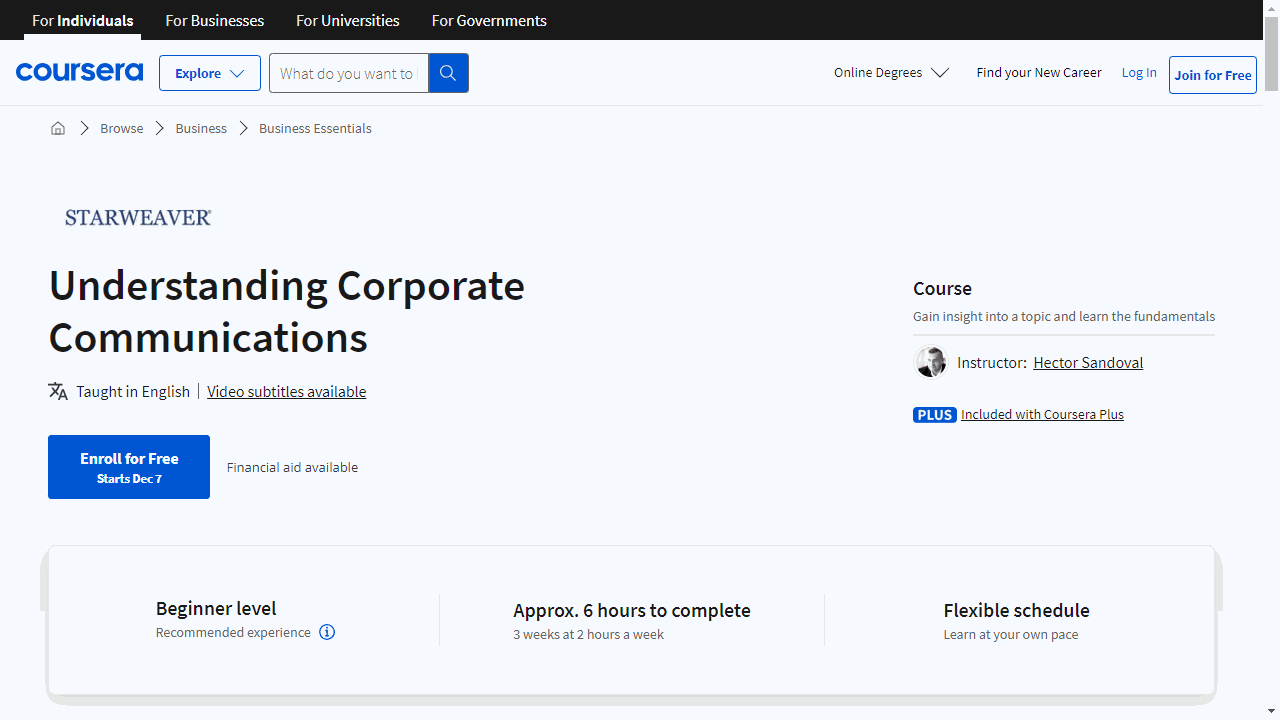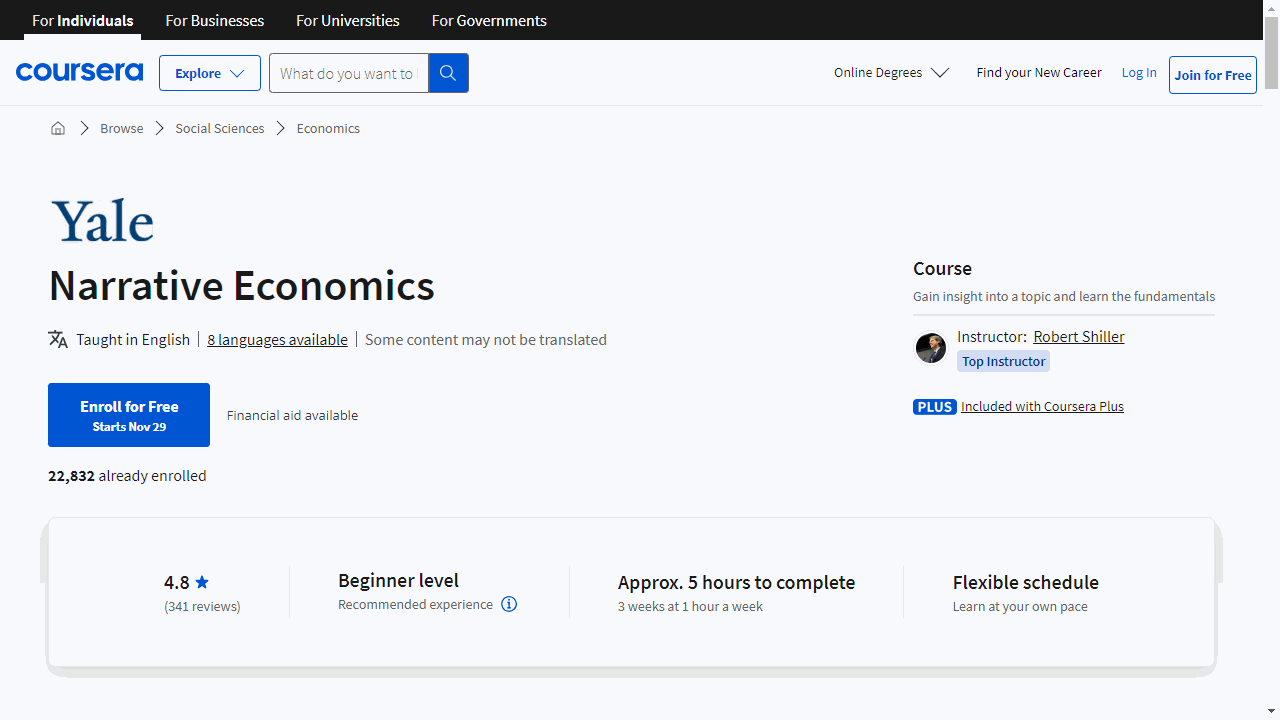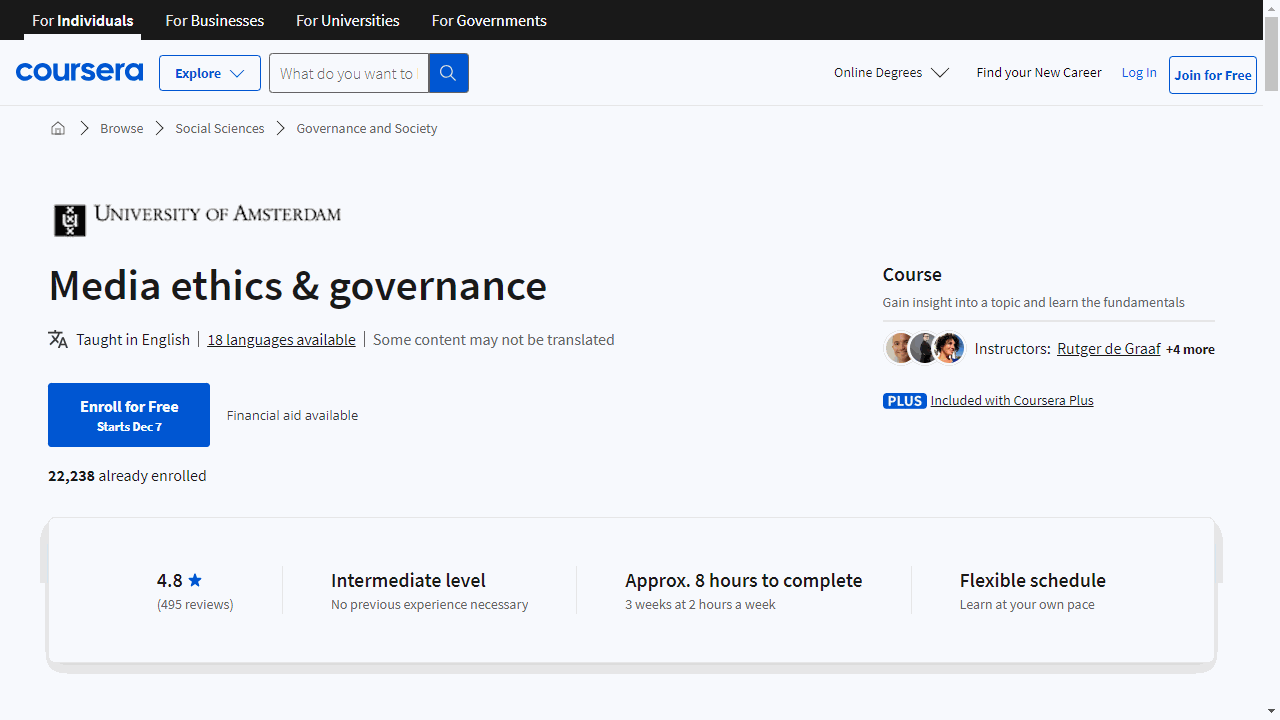Navigating the world of public relations can be daunting, especially in today’s digital landscape.
You need to master crafting compelling narratives, building strong relationships with the media, and understanding the intricacies of strategic communication.
The right course can equip you with the skills and knowledge to excel in this dynamic field.
Finding a good PR course can be a real challenge, especially with so many options out there.
You want something that’s comprehensive, engaging, and taught by experts, but you also want to make sure it fits your learning style and goals.
We’ve looked at the best PR courses on Coursera and narrowed it down to our top picks.
For the best PR course overall, we recommend Integrated Marketing Communications: Advertising, Public Relations, Digital Marketing and more" offered by IE Business School.
This comprehensive course covers a wide range of PR-related topics, including advertising, digital marketing, and crisis management, giving you a well-rounded skill set for tackling any PR challenge.
It’s highly rated for its practical focus and its ability to help students develop the skills they need to succeed in the field.
But if this isn’t quite right for you, we have plenty of other options.
Keep reading for more recommendations on topics like branding, strategic communication, and media ethics.
Introduction to Public Relations and the Media Specialization
This specialization offered by University of Colorado Boulder makes you proficient in modern PR practices, ready to engage with media professionals effectively.
Start with “Principles of Public Relations” to grasp the fundamentals.
You’ll explore the history and future of PR, learn to differentiate it from advertising and marketing, and discover strategies for landing a PR role.
This course emphasizes ethical persuasion, media understanding, audience targeting, and practical PR tools.
Move on to “Working with the Media” to deepen your branding expertise.
You’ll learn how PR supports brand identity, the nuances of mass media theory, and how to craft messages that resonate.
This course focuses on aligning organizational values with PR efforts and navigating crisis management.
Finally, “The Nuts and Bolts of Public Relations” teaches you to create impactful PR collateral.
You’ll master press release writing, develop media relations strategies, and identify compatible social media influencers.
This course is about maintaining your company’s message consistency and fostering productive media relationships.
By completing these courses, you’ll gain proficiency in crafting press releases, shaping brand narratives, and leveraging influencer partnerships.
Strategic Communication Campaigns Specialization
This specialization is offered by University of Colorado Boulder equips you with the skills to craft and convey impactful communication campaigns.
In “Integrated and Strategic Communication Campaigns,” you’ll learn to create impactful messages and choose the best channels and timing for delivery.
This course covers the essentials of communication campaigns, storytelling for your brand, and the strategic use of media.
You’ll finish with the ability to design your own campaign.
“Understanding the Campaign Components” takes you through the development of a strategic communication campaign.
You’ll identify and solve brand communication problems using strategic methods.
The course guides you in crafting a campaign that resonates with your audience and aligns with your brand’s image, all while teaching you to measure its effectiveness through key performance indicators.
The third course, “How to Implement and Evaluate Communication Campaigns,” teaches you the implementation and assessment of your campaign plans.
Through detailed case studies, you’ll learn to evaluate the use of paid, earned, shared, and owned media, ensuring your campaign’s strategy is executed well and its impact is measured accurately.
Across these courses, you’ll gain expertise in strategic management, market research, business communication, and more.
You’ll be able to define communication challenges, design research-based campaigns, and produce professional strategies.
Marketing Strategy for Engineers and Technologists Specialization
This specialization from University of Colorado Boulder goes beyond basic PR—it equips you with the marketing acumen crucial for tech success.
Dive into “Market Research and Analysis for Tech Industries” to grasp consumer needs and behaviors.
You’ll master market segmentation and branding, ensuring your tech product resonates with the right audience.
“Digital Media and Strategic Planning in Technology Markets” teaches you to leverage research for strategic planning.
You’ll navigate the digital marketing landscape, selecting optimal channels to amplify your startup’s message.
In “Building and Pitching Marketing Campaigns in Tech Industries,” you’ll transition from strategy to execution.
Learn to secure resources, forecast revenue, and pitch to investors.
This course also covers public relations strategies and how to sustain brand growth through innovation.
These courses, part of the Master of Engineering in Engineering Management degree, are accessible without a formal application process.
They’re ideal if you aim to lead in the tech sector.
You’ll develop skills in strategic analysis, social media marketing, and branding—all vital for effective public relations.
You’ll also become adept at data-informed decision-making, a key asset in the tech field.
Branding: The Creative Journey Specialization
This specialization by IE Business School equips you with the skills to craft compelling brand narratives and strategies.
Dive into “Brand Identity and Strategy” to grasp the essentials of brand building and consumer segmentation.
Under the guidance of Dr. Maria Eizaguirre, a Rhodes Scholar, you’ll learn to construct brand houses and understand the significance of brand elements like names and logos.
This course will enhance your expertise in advertising and brand identity.
In “Storytelling in Branding and Content Marketing,” you’ll master the art of branded content, differentiating it from traditional advertising.
You’ll learn to weave brand values into stories that forge lasting connections in a crowded content landscape.
“From Brand to Image: Creating High Impact Campaigns That Tell Brand Stories” offers a practical methodology for developing creative campaigns.
This course encourages a fun approach to creating visually and emotionally engaging campaigns, whether you’re working solo or leading a marketing team.
Lastly, “Branding and Customer Experience” merges branding strategy with customer experience, utilizing a framework akin to Customer Journey Mapping.
This course ensures your branding efforts resonate across all customer interactions, fostering alignment and measurable impact across various departments.
Integrated Marketing Communications: Advertising, Public Relations, Digital Marketing and more
This course is offered by IE Business School.
It delves into advertising, digital marketing, and crisis management alongside public relations, providing you with a well-rounded skill set.
You’ll start by grasping the essentials of Integrated Marketing Communications (IMC), learning how to synchronize various marketing strategies to bolster a brand’s image.
Understanding current market trends will keep you ahead, while exploring the marketing process equips you with the knowledge to execute successful campaigns.
Building and maintaining brand loyalty is crucial, and this course teaches you the strategies to achieve it.
You’ll also learn how to select the right marketing communications agency, understanding the impact of an agency’s structure on your campaigns.
The course outlines the necessary skills for working in an advertising agency and introduces you to design thinking—a creative problem-solving approach.
Long-term brand management is also covered, ensuring you know how to sustain a brand’s strength over time.
Consumer behavior is a focal point, with insights into how customers process information and make purchasing decisions.
You’ll become familiar with advertising models like AIDA and the Hierarchy of Effects, as well as the FCB Grid, which categorizes consumer buying approaches.
Budgeting for marketing communications is demystified, teaching you to allocate funds effectively and persuade executives of their importance.
You’ll also discover strategies for building brand recognition.
The curriculum includes a deep dive into message strategies and advertising appeals, such as emotional, fear-based, or humorous content.
Executional frameworks like animation or testimonials are explored to help you craft compelling brand narratives.
Beyond advertising, the course covers sales promotions, public relations, sponsorships, cause-related marketing, and crisis management.
In the digital realm, you’ll stay current with trends in search engine optimization and content marketing, learning to evaluate the success of your campaigns.
Viral Marketing and How to Craft Contagious Content
This course isn’t just about creating buzz; it’s about understanding the mechanics of what makes content spread.
The course begins with a solid foundation, exploring the principles outlined in the book “Contagious: How Things Catch On,” a bestseller by the course’s instructor, Jonah Berger.
You’ll delve into the psychology behind viral trends, equipping you with knowledge that goes beyond the surface level.
As you progress, the course breaks down the essentials of memorable messaging.
You’ll learn to distill complex ideas into simple, impactful messages. Discover how to grab attention with the unexpected, make your message tangible, and establish trust through credibility.
But it doesn’t stop there; you’ll also learn to weave in emotional elements and craft narratives that resonate with audiences.
Understanding the role of social influence is crucial, and this course covers it thoroughly.
You’ll examine how social norms can be leveraged to promote your content and when standing out rather than blending in can be more effective.
Word of mouth is a powerful tool, and you’ll learn to harness it by providing your audience with social currency.
The course teaches you to create triggers that keep your content top of mind, use emotions to boost sharing, and ensure your content is seen and remembered.
The intricacies of social networks are also a focal point. You’ll gain insights into how information spreads through networks and the strategic approaches—like sprinkler and waterfall strategies—that can help you reach your audience more effectively.
Understanding the importance of social ties and what motivates people to share content is key to this section.
At the end, you’ll have a comprehensive understanding of viral marketing.
This isn’t just a series of lectures; it’s an interactive experience designed to equip you with practical skills that you can apply to your marketing efforts.
If you’re ready to dive into the world of viral marketing and create content that makes a lasting impact, this course offers a clear and structured path to get you there.
Communication Strategies for a Virtual Age
This course offered by University of Toronto zeroes in on the essentials of virtual communication, helping you navigate the digital landscape with confidence.
You’ll start by tackling the three main communication traps: unnecessary third-person speak, excessive formality, and information overload.
By recognizing these pitfalls, you can craft messages that are clear and engaging.
The course also delves into the dynamics of remote teams.
You’ll learn to identify and adapt to various virtual team structures, enhancing your sensitivity to the nuances of online collaboration.
Questioning techniques are a focal point.
You’ll discover how to ask impactful questions that drive conversations and uncover valuable insights, a skill crucial for any PR professional.
Understanding communication styles is vital, and you’ll explore four distinct types: hostile, indifferent, uninformed, and supportive.
This knowledge allows you to tailor your approach to different situations and audiences.
Motivation plays a key role in effective communication.
The course covers the motivations of achievement, affiliation, and power, equipping you with the ability to craft compelling messages that resonate with your audience’s drivers.
Negotiation skills are also covered, including strategic questioning and the distinction between positional and principled bargaining.
You’ll engage in a case study to apply these concepts in a practical setting.
Interactive elements like the “5% Rule” and “Area 47” make the learning process engaging, while tools like the “KNOW-Phrase” and the “Belly Button Rule” provide concrete strategies for making your point with precision.
Understanding Corporate Communications
This course equips you with essential skills for effective organizational messaging and corporate communications.
Your journey begins with an introduction to your instructor, followed by a course overview that outlines the learning path ahead.
You’ll delve into the corporate communications function, understanding its significance in organizational success.
Discover the key stakeholders and learn how strategic communication aligns with company objectives.
Internal communication is a focal point, and you’ll learn to develop plans that utilize the right channels to engage employees.
This approach fosters a positive workplace culture.
The course also tackles media relations.
You’ll learn to craft impactful messages, write press releases, and manage media interactions confidently.
In case of a media crisis, you’ll gain insights into reputation management and crisis communication, including strategies, team roles, and the importance of transparency.
Concluding with a final assessment, the course ensures you have a solid grasp of the concepts.
Additional reading materials are available for further exploration.
Narrative Economics
Guided by Professor Robert Shiller (Yale University), an Nobel prize winner in the field, this course goes beyond traditional economic analysis to explore how narratives influence economic behavior.
The journey begins with foundational concepts like the SIR Model and epidemic curves, illustrating how ideas spread.
You’ll get practical with tools like Ngram, tracking the ebb and flow of economic narratives through history.
The course’s core is built around seven thought-provoking propositions.
These explore the dynamics of economic narratives, their scale and speed, and their resilience, even in the face of contradictory evidence.
You’ll understand the role of repetition and emotional attachment in the life cycle of economic stories.
Real-world applications come to life as you examine “perennial narratives,” recurring themes like automation fears and financial booms and busts.
These case studies demonstrate the persistent influence of certain stories on economic behavior.
In the final modules, “consilience” encourages you to synthesize knowledge across disciplines, fostering a holistic understanding of how narratives shape the economic landscape.
You’ll be encouraged to develop your own narrative, applying your newfound insights.
“Narrative Economics” offers a fresh lens through which to view economic phenomena, equipping you with the analytical skills to decipher the stories that drive markets and policy.
Media ethics & governance
This course offered by University of Amsterdam goes into the ethical foundations and governance structures of the media industry, equipping you with the knowledge to make informed, ethical decisions in public relations.
You’ll start by distinguishing ethics from morals, laying the groundwork for advanced concepts.
The course covers consequentialism and utilitarianism, teaching you to evaluate the outcomes of actions in media.
You’ll also explore virtue ethics and deontology, linking these theories directly to communication practices.
The curriculum includes alternative ethical paradigms, such as care ethics and feminine ethics, broadening your perspective on decision-making.
You’ll engage with the history and evolution of media governance, understanding its role as a watchdog and its transformation post-World War II.
As you progress, you’ll examine the ethical dimensions of various communication fields, including entertainment, political journalism, and corporate communication.
The course also addresses the unique ethical challenges posed by digital media.
You’ll participate in analyzing recent ethical dilemmas, debate on marketing ethics, and discuss the nuances of informed consent.
A peer review assignment will enhance your critical thinking and self-reflection skills.
